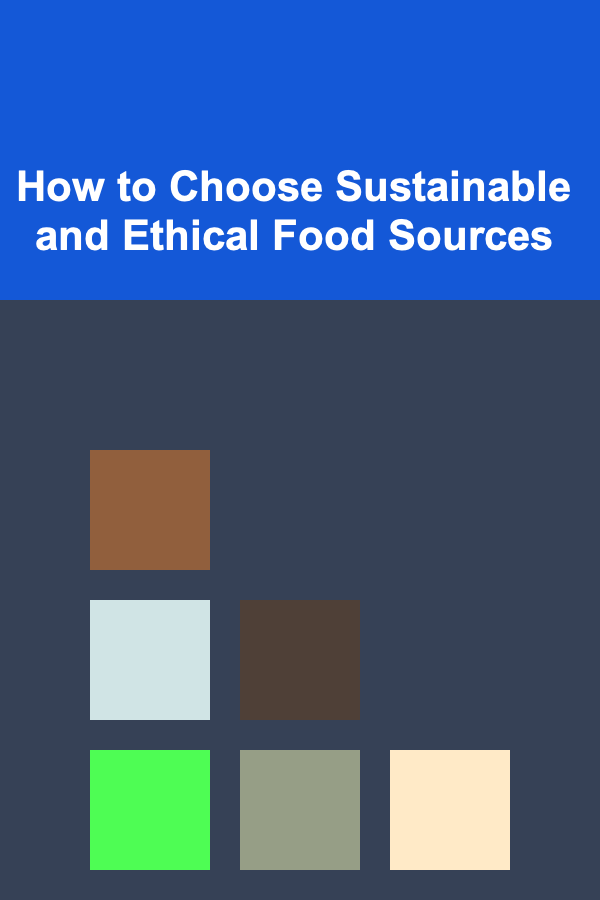
How to Choose Sustainable and Ethical Food Sources
ebook include PDF & Audio bundle (Micro Guide)
$12.99$6.99
Limited Time Offer! Order within the next:

In an era marked by growing environmental awareness, food production is a critical topic of conversation. The food we consume has a profound impact on the planet and the people who work in its production. As concerns about climate change, biodiversity loss, human rights, and health continue to mount, many people are seeking ways to make more sustainable and ethical food choices. Choosing sustainable and ethical food sources is not only about reducing environmental harm, but also about supporting fair labor practices, improving animal welfare, and promoting healthier eating habits.
This article will explore how to make informed, responsible food choices by focusing on key factors like sustainability, ethics, and health. We will also look into the various labels and certifications that guide consumers, offer practical tips for sourcing ethical foods, and examine how these choices affect the broader world.
Understanding Sustainability in Food
Sustainability in food production involves practices that minimize environmental harm while ensuring that the system can continue to meet the needs of future generations. Food systems are complex and involve several stages: from farm to table, including agriculture, transportation, processing, and waste disposal. Sustainability covers all of these stages, with the goal of reducing the ecological footprint of food production.
1. Environmental Impact
The environmental impact of food production is one of the most pressing concerns in the global conversation about sustainability. It includes issues like greenhouse gas emissions, water usage, deforestation, and soil degradation. The agriculture industry is responsible for approximately 25% of global greenhouse gas emissions, largely due to livestock production, fertilizer use, and land conversion for farming.
Some food sources are inherently more sustainable than others. Plant-based foods generally have a lower environmental footprint than animal-based foods because they require fewer resources (like water and land) and produce fewer greenhouse gases. For example, growing vegetables, grains, legumes, and fruits is typically much less resource-intensive than raising cattle or other livestock.
When choosing sustainable food sources, consider the following factors:
- Water usage: Some crops, like almonds and avocados, require significant water resources to grow. Choosing foods with lower water consumption can help reduce your overall environmental impact.
- Carbon footprint: Animal agriculture contributes substantially to carbon emissions. Reducing the consumption of red meat, especially beef, can help mitigate your contribution to climate change.
- Energy usage: The energy used in food production (from planting and harvesting to transportation and processing) affects sustainability. Foods grown locally or seasonally often require less energy to produce and transport.
2. Biodiversity and Land Use
Another key aspect of sustainable food choices is their impact on biodiversity and land use. Agriculture has led to significant deforestation, habitat destruction, and a loss of species. The expansion of monoculture farming---growing a single crop on large tracts of land---has exacerbated this issue by reducing the variety of plant and animal life in agricultural areas.
To support biodiversity, look for foods produced using agroecological or regenerative farming practices, which prioritize soil health, diverse cropping systems, and sustainable land management. These methods not only protect wildlife habitats but also improve soil fertility and increase food security.
3. Waste Reduction
Food waste is another critical aspect of sustainability. According to the Food and Agriculture Organization (FAO), approximately one-third of all food produced globally is wasted. This waste happens at every stage of the food supply chain, from farms to kitchens. By choosing foods with minimal packaging, purchasing only what you need, and learning how to store and preserve food properly, you can help reduce waste and make more sustainable food choices.
The Ethics of Food Production
Ethical food choices go beyond environmental considerations---they also involve the well-being of workers, animals, and local communities. The ethics of food production encompass labor rights, animal welfare, fair trade, and social justice. Here are some of the key areas to consider:
1. Fair Labor Practices
The food industry relies heavily on labor, from farm workers to food processors to delivery drivers. Unfortunately, many workers in the food system are subject to poor working conditions, low wages, and even exploitation. For instance, workers on large-scale farms or in the seafood industry often face unsafe working environments and are denied basic labor rights.
Ethical food choices involve supporting businesses and organizations that prioritize fair wages, safe working conditions, and respect for workers' rights. Look for labels such as Fair Trade Certified, which guarantees that the people who produce the food are paid fairly and work in humane conditions. Additionally, consider purchasing food directly from local farmers or cooperatives, where there is often more transparency about the conditions under which workers operate.
2. Animal Welfare
Animal welfare is another significant ethical concern in food production. In industrial farming, animals are often raised in crowded, unsanitary conditions, with limited access to natural behaviors. Factory farming practices, such as confinement and the use of growth hormones or antibiotics, raise serious ethical questions about the treatment of animals.
To choose food that aligns with ethical standards of animal welfare, consider buying meat, eggs, and dairy products from sources that prioritize humane treatment. Labels like Certified Humane , Animal Welfare Approved , or Pasture-Raised indicate that the animals were raised in conditions that allow them to exhibit natural behaviors and live in environments that prioritize their well-being.
Plant-based diets are also an ethical choice for many individuals, as they do not involve the direct exploitation of animals. Reducing animal-based food consumption can contribute to a decrease in demand for factory farming, leading to less harm to animals.
3. Supporting Local Communities
Ethical food sourcing also means supporting local farmers and communities, especially those that engage in fair trade practices. By purchasing food that is grown locally or through fair trade systems, you help ensure that small-scale farmers receive fair compensation for their work. Additionally, this approach helps build stronger, more resilient communities by reducing reliance on large corporations that often prioritize profits over people.
4. Transparency and Accountability
In an ethical food system, transparency and accountability are crucial. Consumers have a right to know where their food comes from, how it was produced, and the social and environmental impacts of its production. Look for brands and companies that are transparent about their supply chains and production practices.
Labels like Fair Trade Certified , Rainforest Alliance Certified , and Non-GMO Project Verified can give you an indication of a company's commitment to ethical practices. However, it is essential to research these certifications and ensure they align with your values, as not all certifications are created equal.
Tips for Choosing Sustainable and Ethical Foods
1. Prioritize Plant-Based Foods
A plant-based diet is one of the most sustainable and ethical food choices you can make. Producing plant-based foods requires far fewer resources than animal products, and it has a lower environmental impact overall. By reducing meat consumption and increasing the amount of fruits, vegetables, legumes, and grains in your diet, you can make a significant difference.
2. Buy Local and Seasonal
Local and seasonal foods are typically produced with fewer resources and have a lower carbon footprint than imported foods. They also support local farmers and communities. Visit farmers' markets, join a Community Supported Agriculture (CSA) program, or seek out local food cooperatives to find sustainable options near you.
3. Look for Certified Labels
Various certifications help identify sustainable and ethical food choices. Some of the most common labels to look for include:
- Certified Organic: Foods produced without synthetic pesticides or fertilizers, which promote biodiversity and soil health.
- Fair Trade Certified: Ensures fair wages and ethical treatment of workers in developing countries.
- Rainforest Alliance Certified: Promotes sustainable farming practices that protect the environment and support local communities.
- Non-GMO Project Verified: Ensures that the food is not genetically modified, which may be important for some consumers concerned about the potential environmental and health impacts of GMOs.
4. Reduce Food Waste
To make your food choices more sustainable, it is essential to reduce food waste. Plan your meals, buy in moderation, and store food correctly to extend its shelf life. Composting food scraps is another great way to reduce waste and improve soil health.
5. Research Brands and Companies
Before purchasing food from a particular brand, take the time to research their practices. Look into how they source their ingredients, treat their workers, and manage environmental impacts. Companies that are committed to sustainability and ethical practices will often provide detailed information on their websites or packaging about their efforts to reduce their ecological footprint and support communities.
Conclusion
Choosing sustainable and ethical food sources is not always easy, but it is an important step toward making a positive impact on the environment, society, and health. By considering the environmental, ethical, and health implications of your food choices, you can contribute to a food system that is more just, humane, and resilient.
Making responsible food choices involves considering factors such as environmental sustainability, fair labor practices, animal welfare, and social justice. By prioritizing plant-based options, buying local and seasonal foods, supporting ethical brands, and reducing food waste, you can help create a more sustainable food system.
As consumers, we have the power to shape the future of food production. By being informed and conscious of where our food comes from, we can contribute to a healthier, more ethical, and more sustainable world.

How to Optimize Storage in Your Bathroom Without Renovating
Read More
How to Use Drawer Dividers for Effective Storage
Read More
How to Use Seasonal Decor to Keep Your Home Fresh
Read More
Navigating the Dental Practice: Collaboration and Communication with Dentists
Read More
The Benefits of Utilizing Community Resources for Personal Growth
Read More
Unlocking Dynamic Power: A Comprehensive Guide to Medicine Ball Workouts
Read MoreOther Products

How to Optimize Storage in Your Bathroom Without Renovating
Read More
How to Use Drawer Dividers for Effective Storage
Read More
How to Use Seasonal Decor to Keep Your Home Fresh
Read More
Navigating the Dental Practice: Collaboration and Communication with Dentists
Read More
The Benefits of Utilizing Community Resources for Personal Growth
Read More